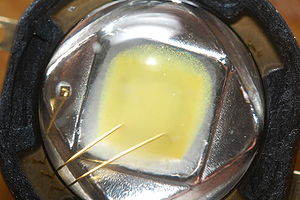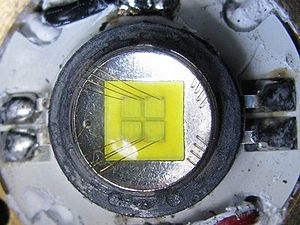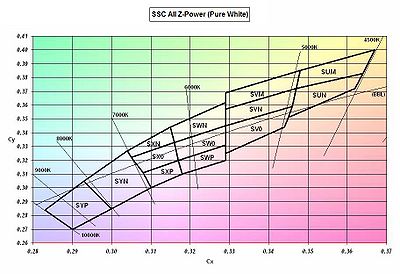Seoul Semiconductor: Difference between revisions
(Created page with "Seoul Semiconductor Co., Ltd. is a Korean company that produces LED's. Their P4 and P7 LED's are used in a number of flashlights. The P4 uses Cree's EZ1000 die and has simila...") |
(replace LED's with LEDs) |
||
| (11 intermediate revisions by 2 users not shown) | |||
| Line 1: | Line 1: | ||
Seoul Semiconductor Co., Ltd. is a Korean company that produces | Seoul Semiconductor Co., Ltd. is a Korean company that produces LEDs. Their P4 and P7 LEDs were used in a number of flashlights though these are fairly old and do not appear to have been updated. | ||
==P4 LED== | |||
[[File:Sscp4.jpg|thumb|SSC P4 LED]]The P4 uses [[Cree]]'s EZ1000 die and has similar performance to the Cree XR-E LED. Do not confuse the Cree P4 bin (brightness) with the SSC P4 LED. The SSC P4 LED was much used as a "drop in" replacement for Lumileds Luxeon 3 LEDs. It gave about twice the output for about three times as long on the same battery and driver as a Luxeon 3. It had the same die height and beam pattern as the Luxeon 3 which the then new Cree LEDs did not. | |||
[http://www.seoulsemicon.com/en/product/prd/zpowerLEDp4.asp P4 web page] | |||
{|class="wikitable" style="text-align: center; width: 400px;" | |||
|+ Seoul Semiconductor P4 [[Brightness Bins]]<BR>Max bin available is U2 | |||
|- | |||
!Bin !! 350mA !! 1000mA | |||
|- | |||
|S1 || 54-60 || 127-141 | |||
|- | |||
|S2 || 60-70 || 141-165 | |||
|- | |||
|T1 || 70-80 || 165-188 | |||
|- | |||
|T2 || 80-91 || 188-214 | |||
|- | |||
|U1 || 91-100 || 214-235 | |||
|- | |||
|'''U2*''' || 100-109 || 235-256 | |||
|- | |||
|U3 || 109-119 || 256-280 | |||
|} | |||
==P7 LED== | ==P7 LED== | ||
[[File:sscp7led.jpg|thumb|SSC P7 LED]]The P7 is a multi-die LED utilizing four P4 LEDs. P7 LEDs have bin names that indicate brightness, color tint, and forward voltage. For instance a DSXOI bin indicates brightness level D, color SXO, and forward voltage of I. [http://www.seoulsemicon.com/en/product/prd/zpowerLEDp7.asp P7 web page] | |||
The P7 is a multi-die LED utilizing four P4 | |||
Brightness: Usually C or D where C is 700-800 lumens and D is 800-900 lumens (measured at 2.8 amps), but really there is some overlap where a low-end D might be less bright than a high-end C. | Brightness: Usually C or D where C is 700-800 lumens and D is 800-900 lumens (measured at 2.8 amps), but really there is some overlap where a low-end D might be less bright than a high-end C. | ||
Color: A common cool white color bin is SXO, while SWO is | Color: A common cool white color bin is SXO (6700K), while SWO is not as cool (6050K), and SVN is almost neutral (5350K). See chart below for all of the SSC tint bins and color temperatures, though not all bins on the chart are actually available. | ||
Forward voltage: I and J are common. I is 3.25-3.50V and J is 3.50-3.75V, again with some overlap possible. | Forward voltage: I and J are common. I is 3.25-3.50V and J is 3.50-3.75V, again with some overlap possible. | ||
The dies are manufactured for SSC by Cree, but the phosphor is SSC's own. Many prefer the P7 to the Cree MC-E which has the same dies but different phosphors and optics. | |||
{|class="wikitable" style="text-align: center; width: 400px;" | |||
|+ Seoul Semiconductor P7<BR>Max bin available is D | |||
|- | |||
!Bin !! 1400mA !! 2800mA | |||
|- | |||
|A || 251-326 || 440-570 | |||
|- | |||
|B || 326-400 || 570-700 | |||
|- | |||
|C || 400-457 || 700-800 | |||
|- | |||
|'''D*''' || 457-514 || 800-900 | |||
|- | |||
|E || 514-629 || 900-1100 | |||
|} | |||
==Tint bins== | |||
[[File:Ssctints.jpg|thumb|400px|SSC's tint bins]]SSC does not use the [[ANSI White]] standard, but comparisons can still be made by using the color temperatures shown on the chart at the right. The bins used here only cover the first 3 or 4 cooler white quadrangles of ANSI White. For more information on binning see the Binning and Labeling guides available at the product links listed above. | |||
Latest revision as of 12:28, 25 January 2014
Seoul Semiconductor Co., Ltd. is a Korean company that produces LEDs. Their P4 and P7 LEDs were used in a number of flashlights though these are fairly old and do not appear to have been updated.
P4 LED

The P4 uses Cree's EZ1000 die and has similar performance to the Cree XR-E LED. Do not confuse the Cree P4 bin (brightness) with the SSC P4 LED. The SSC P4 LED was much used as a "drop in" replacement for Lumileds Luxeon 3 LEDs. It gave about twice the output for about three times as long on the same battery and driver as a Luxeon 3. It had the same die height and beam pattern as the Luxeon 3 which the then new Cree LEDs did not.
| Bin | 350mA | 1000mA |
|---|---|---|
| S1 | 54-60 | 127-141 |
| S2 | 60-70 | 141-165 |
| T1 | 70-80 | 165-188 |
| T2 | 80-91 | 188-214 |
| U1 | 91-100 | 214-235 |
| U2* | 100-109 | 235-256 |
| U3 | 109-119 | 256-280 |
P7 LED

The P7 is a multi-die LED utilizing four P4 LEDs. P7 LEDs have bin names that indicate brightness, color tint, and forward voltage. For instance a DSXOI bin indicates brightness level D, color SXO, and forward voltage of I. P7 web page
Brightness: Usually C or D where C is 700-800 lumens and D is 800-900 lumens (measured at 2.8 amps), but really there is some overlap where a low-end D might be less bright than a high-end C.
Color: A common cool white color bin is SXO (6700K), while SWO is not as cool (6050K), and SVN is almost neutral (5350K). See chart below for all of the SSC tint bins and color temperatures, though not all bins on the chart are actually available.
Forward voltage: I and J are common. I is 3.25-3.50V and J is 3.50-3.75V, again with some overlap possible.
The dies are manufactured for SSC by Cree, but the phosphor is SSC's own. Many prefer the P7 to the Cree MC-E which has the same dies but different phosphors and optics.
| Bin | 1400mA | 2800mA |
|---|---|---|
| A | 251-326 | 440-570 |
| B | 326-400 | 570-700 |
| C | 400-457 | 700-800 |
| D* | 457-514 | 800-900 |
| E | 514-629 | 900-1100 |
Tint bins

SSC does not use the ANSI White standard, but comparisons can still be made by using the color temperatures shown on the chart at the right. The bins used here only cover the first 3 or 4 cooler white quadrangles of ANSI White. For more information on binning see the Binning and Labeling guides available at the product links listed above.